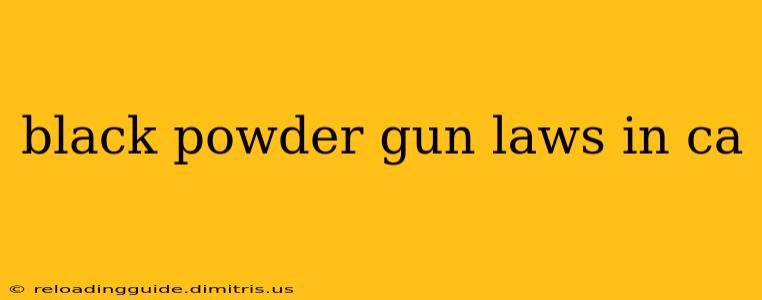California's firearm laws are notoriously complex, and black powder guns are no exception. While often perceived as less regulated than modern firearms, black powder weapons still fall under the purview of several state and federal laws. Understanding these regulations is crucial for responsible ownership and to avoid legal repercussions. This guide provides a comprehensive overview, but it's not a substitute for legal advice. Always consult with a legal professional specializing in California firearm law for personalized guidance.
What Constitutes a "Black Powder Gun" in California?
In California, the definition of a "black powder gun" hinges on its design and function. Generally, it refers to firearms that use black powder as a propellant. This includes:
- Muzzleloading firearms: These are firearms where the projectile (bullet, ball, or shot) is loaded from the muzzle (the front end of the barrel). This is the most common type of black powder firearm.
- Black powder revolvers and pistols: While less common, some revolvers and pistols are designed for black powder use.
- Black powder rifles: Similar to muzzleloaders, black powder rifles can range from historically accurate replicas to modern designs adapted for black powder use.
It's crucial to understand that the caliber of the firearm is less relevant than the propellant used. A large-caliber muzzleloader still counts as a black powder firearm, even if it might have a significant impact.
California's Key Black Powder Gun Laws:
While not subject to the same stringent regulations as modern firearms, black powder guns in California are still regulated under several laws:
1. Age Restrictions:
- Individuals under the age of 18 generally cannot possess or purchase black powder firearms without adult supervision. The specific regulations can vary depending on the firearm's classification.
2. Purchase and Transfer:
- No background checks are required for the purchase of black powder firearms in California. This is a significant difference from modern firearms.
- Private transfers are generally permitted, but always ensure you are complying with all other applicable state and federal laws.
3. Safe Storage and Transportation:
- While not specifically addressed in the same way as modern firearms, responsible storage and transportation are paramount. Storing black powder and firearms separately is crucial to prevent accidental ignition. Secure transportation methods are also vital.
4. Specific Restrictions by Firearm Type:
- Some antique black powder firearms might be exempt from certain regulations, but this depends heavily on their age and classification. Determining antique status is complex and often requires expert assessment.
5. Local Ordinances:
- Always be aware of local ordinances. Cities and counties may have additional restrictions on the possession, use, or transportation of black powder firearms, even if they comply with state law.
Understanding the Differences from Modern Firearms:
The key difference between black powder firearm laws and modern firearm laws in California lies in the absence of a background check requirement for purchase. However, this doesn't mean they're unregulated. Responsible ownership includes understanding and complying with all applicable laws, including those concerning safe storage, transportation, and local ordinances.
Resources and Further Information:
For the most up-to-date and accurate information, consult the official website of the California Department of Justice, Bureau of Firearms. Remember, this information is for general guidance only. Always seek professional legal counsel regarding California's firearm laws.
Disclaimer: This information is for educational purposes only and does not constitute legal advice. The laws governing firearms are complex and frequently change. Always consult with a qualified legal professional for advice tailored to your specific circumstances.

